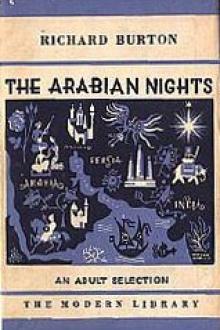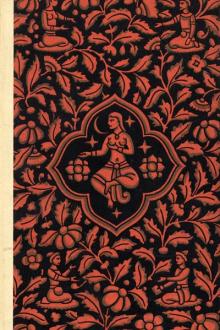author - "Sir Richard Francis Burton"

he Chief of Police47. Al-Malik Al-Nasir and the Three Chiefs of Policea. Story of the Chief of Police of Cairob. Story of the Chief of the Bulak Policec. Story of the Chief of the Old Cairo Police48. The Thief and the Shroff49. The Chief of the Kus Police and the Sharper50. Ibrahim Bin Al-Mahdi and the Merchant's Sister51. The Woman Whose Hands were Cut Off For Giving Alms to thePoor52. The Devout Israelite53. Abu Hassan Al-Ziyadi and the Khorasan54. The Poor Man and His Friend in Need55. The

b. The Breslau Textc. The Macnaghten Text and the Bulak Editiond. The same with Mr. Lane's and my VersionAppendix II--Contributions to the Bibliography of the Thousand andOne Nights and their Imitations, By W. F. KirbyThe Book Of TheTHOUSAND NIGHTS AND A NIGHT MA'ARUF THE COBBLER AND HIS WIFE There dwelt once upon a time in the God-guarded city of Cairo acobbler who lived by patching old shoes.[FN#1] His name wasMa'aruf[FN#2] and he had a wife called Fatimah, whom the folk hadnicknamed

o her and kissedher and asked, "How knewest thou that I should come to thee thisvery night?" She answered, "I knew it not! By Allah, this wholeyear past I have not tasted the taste of sleep, but have watchedthrough every night, expecting thee; and such hath been my casesince the day thou wentest out from me and I gave thee the newsuit of clothes, and thou promisedst me to go to the Hammam andto come back! So I sat awaiting thee that night and a secondnight and a third night; but

he youth kissed the hand of his sire who said, "O my son, were I sure that thou wouldest deal justly by Anis al-Jalis, I would give her to thee." "O my father, what justice am I to do to her?" "I enjoin thee, O my son, not to take another wife or concubine to share with her, nor sell her." "O my father! I swear to thee that verily I will not do her injustice in either way." Having sworn to that effect Nur al-Din went in to the damsel and abode with her a

Introduction Story Of King Shahryar and His Brother a. Tale of the Bull and the Ass 1. Tale of the Trader and the Jinni a. The First Shaykh's Story b. The Second Shaykh's Story c. The Third Shaykh's Story 2. The Fisherman and the Jinni a. Tale of the Wazir and the Sage Duban ab. Story of King Sindibad and His Falcon ac. Tale of the Husband and the Parrot ad. Tale of the Prince and the Ogress b. Tale of the Ensorcelled Prince 3. The Porter and the Three Ladies of Baghdad a. The First Kalandar's

e of love, and appears to have borrowed largely from Vatsyayana on the subject. Now Virahamihira is said to have lived during the sixth century A.D., and as Vatsya must have written his works previously, therefore not earlier than the first century A.D., and not later than the sixth century A.D., must be considered as the approximate date of his existence. On the text of the 'Aphorisms on Love', by Vatsyayana, only two commentaries have been found. One called 'Jayamangla' or 'Sutrabashya', and

he Chief of Police47. Al-Malik Al-Nasir and the Three Chiefs of Policea. Story of the Chief of Police of Cairob. Story of the Chief of the Bulak Policec. Story of the Chief of the Old Cairo Police48. The Thief and the Shroff49. The Chief of the Kus Police and the Sharper50. Ibrahim Bin Al-Mahdi and the Merchant's Sister51. The Woman Whose Hands were Cut Off For Giving Alms to thePoor52. The Devout Israelite53. Abu Hassan Al-Ziyadi and the Khorasan54. The Poor Man and His Friend in Need55. The

b. The Breslau Textc. The Macnaghten Text and the Bulak Editiond. The same with Mr. Lane's and my VersionAppendix II--Contributions to the Bibliography of the Thousand andOne Nights and their Imitations, By W. F. KirbyThe Book Of TheTHOUSAND NIGHTS AND A NIGHT MA'ARUF THE COBBLER AND HIS WIFE There dwelt once upon a time in the God-guarded city of Cairo acobbler who lived by patching old shoes.[FN#1] His name wasMa'aruf[FN#2] and he had a wife called Fatimah, whom the folk hadnicknamed

o her and kissedher and asked, "How knewest thou that I should come to thee thisvery night?" She answered, "I knew it not! By Allah, this wholeyear past I have not tasted the taste of sleep, but have watchedthrough every night, expecting thee; and such hath been my casesince the day thou wentest out from me and I gave thee the newsuit of clothes, and thou promisedst me to go to the Hammam andto come back! So I sat awaiting thee that night and a secondnight and a third night; but

he youth kissed the hand of his sire who said, "O my son, were I sure that thou wouldest deal justly by Anis al-Jalis, I would give her to thee." "O my father, what justice am I to do to her?" "I enjoin thee, O my son, not to take another wife or concubine to share with her, nor sell her." "O my father! I swear to thee that verily I will not do her injustice in either way." Having sworn to that effect Nur al-Din went in to the damsel and abode with her a

Introduction Story Of King Shahryar and His Brother a. Tale of the Bull and the Ass 1. Tale of the Trader and the Jinni a. The First Shaykh's Story b. The Second Shaykh's Story c. The Third Shaykh's Story 2. The Fisherman and the Jinni a. Tale of the Wazir and the Sage Duban ab. Story of King Sindibad and His Falcon ac. Tale of the Husband and the Parrot ad. Tale of the Prince and the Ogress b. Tale of the Ensorcelled Prince 3. The Porter and the Three Ladies of Baghdad a. The First Kalandar's

e of love, and appears to have borrowed largely from Vatsyayana on the subject. Now Virahamihira is said to have lived during the sixth century A.D., and as Vatsya must have written his works previously, therefore not earlier than the first century A.D., and not later than the sixth century A.D., must be considered as the approximate date of his existence. On the text of the 'Aphorisms on Love', by Vatsyayana, only two commentaries have been found. One called 'Jayamangla' or 'Sutrabashya', and